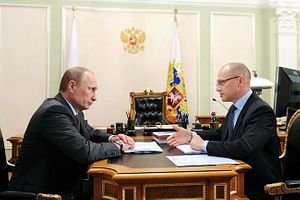On April 14, Russia and Laos inked a new pact on nuclear energy that seeks to deepen the collaboration between both sides in the field.
A memorandum of cooperation was signed in Moscow by the Russian state nuclear corporation Rosatom and the ministry of energy and mines of Laos. The MoU was signed by Rosatom deputy director general Kirill Komarov and Laos’ deputy energy minister Sinava Souphanouvong, with the ceremony witnessed by Rosatom director general Sergey Kirienko and deputy prime minister of Laos, Somsavat Lengsavad.
According to World Nuclear News, the pact sets out a plan by Rosatom and Laos to cooperate in the design, construction and operation of nuclear power plants and research reactors. Beyond this, the agreement also specifies cooperation in specific areas as well including basic and applied research; nuclear and radiation safety; research and development in the field of nuclear medicine technology; and in education and training.
The development comes just months after news broke that Laos was in talks with Rosatom to set up nuclear power plants in the country. Reports in September 2015 had suggested that Vientiane had intended to cooperate with Rosatom build two nuclear power plants of VVER-type on a build-operate-transfer basis, with a capacity of between 1000 – 1200 MW each. Rosatom, a global leader in nuclear technology, has been responsible for building over 30 nuclear power reactors, most of which have been set up abroad including in Asian countries like China and Vietnam.
Thus far, Laos, a landlocked nation, has been largely playing up its potential in the hydropower sector, marketing itself as the “battery of Southeast Asia.” More broadly, renewable energy features prominently in the government’s energy projections as it seeks to achieve a 90 percent electrification target by 2020. The Lao government has set a 30 percent penetration target for renewable energy technologies by 2025.
The memorandum between Rosatom and Laos is just the first step in collaboration between the two sides. It provides for the setting up of a joint working group to come up with specific projects to be undertaken. Rosatom also said that the two parties plan to develop and sign an intergovernmental pact on nuclear energy cooperation.

































